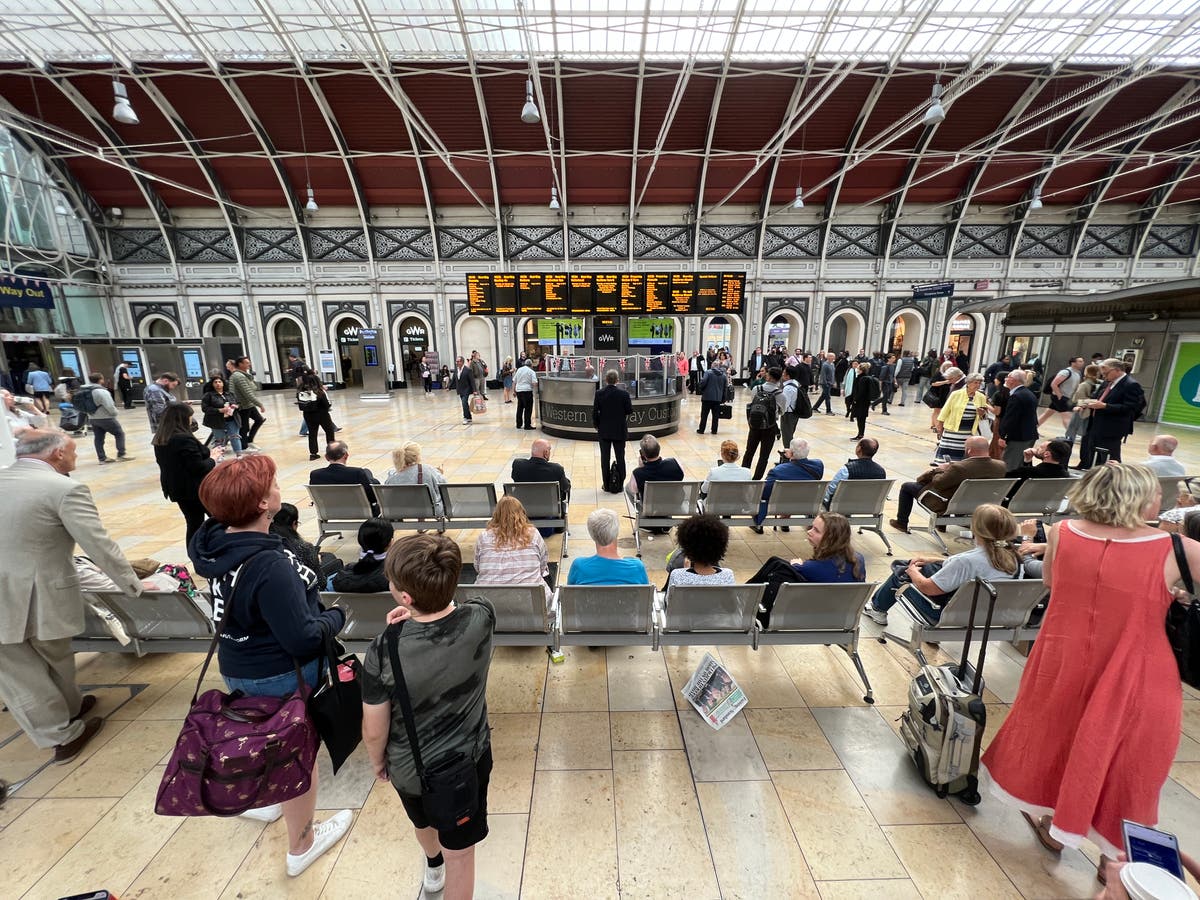This website uses cookies so that we can provide you with the best user experience possible. Cookie information is stored in your browser and performs functions such as recognising you when you return to our website and helping our team to understand which sections of the website you find most interesting and useful.

During the planned nationwide rail strikes for three dates in late June, only limited passenger train services will run – most of them on key links to and from London.
Members of the RMT rail union at Network Rail and 13 train operators voted 8:1 in favour of strike action over jobs, pay and conditions, and will stage 24-hour walkouts on 21, 23 and 25 June.
According to the RMT, it is “the biggest dispute on the network since 1989” and will involve 40,000 workers.
A senior rail source said the plan was to run “as decent a rail service as we can”.
Only around half of Britain’s rail network will be open on strike days, from around 7.30am until 6.30pm.
At Network Rail, the infrastructure provider, the most critical roles in the day-to-day running of the railway are 5,000 signallers.
Management and other staff are expected to cover about half the network for about 11 hours per day. Many lines will see no trains.
Wales and Scotland are expected to see a much smaller proportion of their networks open.
The key links to and from London that will be operating, clockwise from the Thames Estuary, are:
- HS1 from London St Pancras to Ashford (including Eurostar services to Paris, Brussels and Amsterdam)
- London to Gatwick airport and Brighton
- London Waterloo to Reading, Winchester and Southampton
- London Paddington to Reading, Taunton. Exeter, Plymouth, Bath, Bristol, Cardiff
- London Paddington to Heathrow airport (all terminals)
- London Marylebone to Banbury
- West Coast main line from London Euston to Birmingham, Manchester and Glasgow
- East Midlands Railway from London St Pancras to Leicester, Nottingham, Derby and Sheffield
- East Coast main line from London King’s Cross to Leeds, York and Newcastle
- London King's Cross to Cambridge and Ely
- London Liverpool Street to Stansted airport and Cambridge
In addition, a limited number of key routes not touching London will operate:
- Glasgow to Edinburgh
- Cardiff to the Valleys
- Birmingham to Leeds
- Isle of Wight
- East-west links from Liverpool via Manchester and Leeds to Cleethorpes and Middlesbrough, with some trains serving Manchester airport
Even on lines that are running, not every station will be open. For example, Avanti West Coast says: “Due to the different signalling system in use on some parts of the West Coast main line, which is more resource-intensive to operate, the intercity operator is unable to stop trains at Stoke-on-Trent, Macclesfield, Stockport, as well as Runcorn, on strike days and these stations will not be open.
On all lines that are running, there will be strict limits on the amount of traffic replacement signallers could handle.
As a result of the limited hours, key final services are scheduled to leave London at:
- Bristol 4.33pm
- Cardiff 4.27pm
- Birmingham 3.50pm
- Manchester 3.40pm
- Sheffield 3.31pm
- Leeds 3.05pm
- Newcastle 3pm
- Edinburgh 2pm
The industrial action is timed to affect services immediately before and after the strike dates, as well as the intervening Wednesday and Friday. In particular signallers will not work overnight, which will mean the first wave of trains will be very limited on many routes.
The train operators affected include Avanti West Coast, East Midlands Railway, Greater Anglia, GWR, LNER, Northern, Southeastern and South Western Railway.
At one train operator, GTR, backing was too low to pass the threshold for a strike. GTR normally has the highest number of passengers of any operator – with commuter journeys on Southern, Thameslink, Gatwick Express and Great Northern services in southeast England.
The dispute is expected to wipe out up to £150m in ticket revenue, with tens of millions of pounds of costs also incurred for engineering works that cannot take place.
The damage to forward revenue will be intensifed if leisure and business passengers abandon plans to make journeys later in the summer by trains.
Passengers with Advance tickets are generally entitled to full refunds on strike days, even if the train runs. Train operators will not meet claims for alternative transport.
Of the 71 per cent of members who voted, 89 per cent backed strike action. This represents 63 per cent of the workforce balloted, numbering more than 25,000 workers.
The RMT’s general secretary, Mick Lynch, has vowed “a sustained campaign of industrial action which will shut down the railway system”.
The union says: “Network Rail and the train operating companies have subjected their staff to multi-year pay freezes and plan to cut thousands of jobs which will make the railways unsafe.”
Senior rail sources insist that safety will not be compromised by modernisation, and that a reduction in staffing
The white-collar rail union, TSSA, is threatening what its general secretary called “a summer of discontent”. Members are being consulted ahead of a possible strike ballot if pay fails to keep pace with inflation – expected to reach double figures by summer.



 Africana55 Radio
Africana55 Radio 
